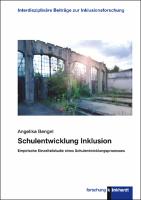Schulentwicklung Inklusion
Empirische Einzelfallstudie eines Schulentwicklungsprozesses
Abstract
The research examines the question of conditions for an inclusive school development process from the perspective of teachers. As a qualitative individual case study, the work shows the com-plexity of the development process according to the description of a school as a pedagogical unit (cf. Fend 1986, 275).School development is a permanent challenge for the school in interaction with a changing en-vironment. Accordingly, there are various approaches to shaping or accompanying these school development tasks. The fundamental assumption for this work is that the school itself functions as the motor of development (cf. Dalin, Rolff 1990), since innovations, such as the implemen-tation of inclusion in schools, are interpreted, adapted, and adjusted to one’s own reality by the actors and not implemented inflexibly. The approach is based on the assumption that schools cannot change if the behaviour of their members does not shift. At the same time, an individual change of the members will remain unsuccessful if the framework conditions do not develop with them (cf. Rolff 2007, 14). The dissertation succeeds in working out the interplay between personal experiences of change at the member level and the changing framework conditions of the individual school. In order to analyse the school development process at the actual implementation level, a school was visited on its way to becoming a school for all over the course of two years, and data was successively collected and evaluated by means of a grounded theory study from the perspective of teachers using group discussions, interviews based on photographic evidence, and document research. On the basis of the data evaluation, it will be possible to give an overview of the central topics in the inclusive school development process, to show a heterogeneous positioning within the teachers’ inner circle and to work out the connection between these two aspects and thus their relations. In the course of the interpretation, the aspects of the school as an obstacle in the inclusive school development process, the interpretation of the inclusive school development project by the teachers, a changed student body as a starting point for new challenges in every-day working life as well as professionalism as a strateg y to meet the new challenges are exam-ined. The study can be linked to work that, for example, addresses the need for transparency and participation in inclusive school development processes. At the same time, the work presented can emphasise the aspect of interpretation by teachers.
Keywords
Veränderungsprozess, Schule für Alle, Schulentwicklungsprozess, Inklusion, Inklusionsforschung, Integration, Lehrkraft, Heterogenität, Schulentwicklung, Schulform, Lehrer, Perspektive, Entwicklungsprozess, Integrative Schule, Schulische Integration, Sonderpädagogischer Förderbedarf, Organisation, Organisationsentwicklung, Verbundene Haupt- und Realschule, Grundschule, Qualitative Forschung, Empirische Untersuchung, Fallbeispiel, Fallstudie, Grounded Theory, Schulorganisation, DeutschlandDOI
10.35468/5896ISBN
9783781524569, 9783781558960Publisher
Verlag Julius KlinkhardtPublication date and place
Bad Heilbrunn, 2021Grantor
Series
Interdisziplinäre Beiträge zur Inklusionsforschung,Classification
Inclusive education / mainstreaming
Educational strategies and policy: inclusion


 Download
Download Web Shop
Web Shop